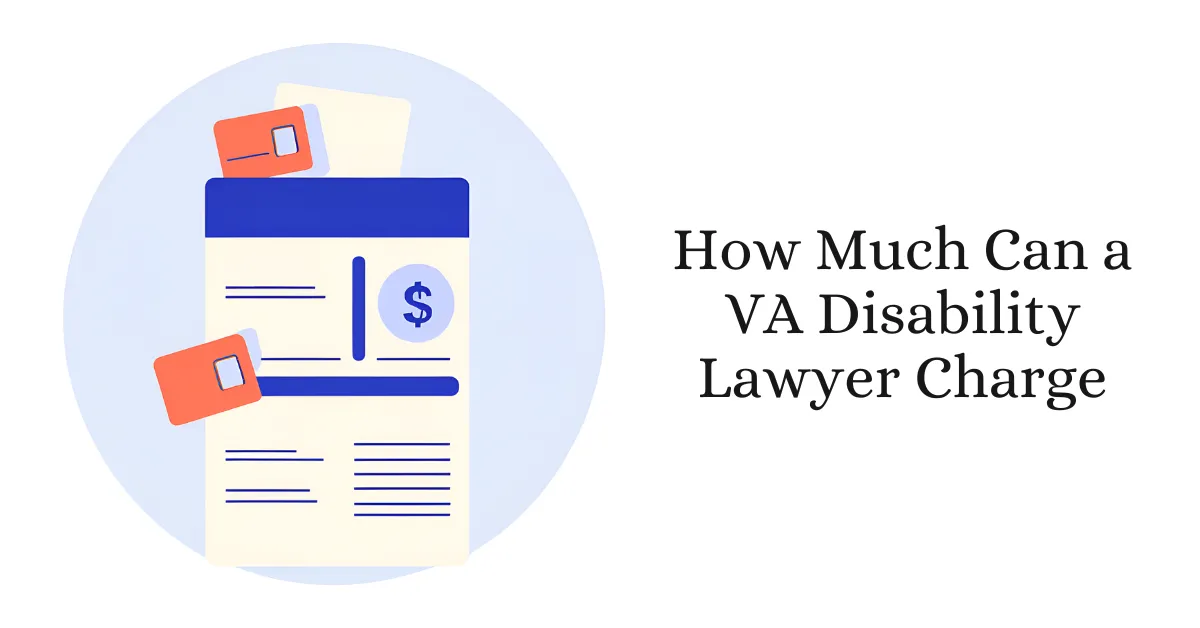Navigating a VA disability claim can be frustrating, especially if you’re facing delays or denials. That’s where a VA disability lawyer can help. These lawyers specialize in handling appeals, ensuring you get the compensation you deserve.
However, hiring legal representation comes with costs, and it’s important to understand how VA disability lawyers charge for their services. Unlike other attorneys, their fees are regulated to protect veterans from excessive charges.
Before committing to a lawyer, knowing the different fee structures, legal limits, and what to expect financially can help you make an informed decision. Let’s break down how these fees work.
Types of VA Disability Lawyer Fees
VA disability lawyers typically charge fees in one of three ways: contingency fees, hourly rates, or flat fees. Understanding these options can help you choose the best legal representation for your needs.
- Contingency Fees: Most VA disability lawyers work on a contingency basis. This means they only get paid if your claim is successful, usually taking a percentage of your past-due benefits (back pay).
- Hourly Rates: Some lawyers charge by the hour, though this is less common for VA claims. Hourly fees can add up quickly, making this option less favorable for most veterans.
- Flat Fees: In some cases, a lawyer may charge a one-time flat fee for specific services, such as filing an initial claim or reviewing documents. Flat fees are generally not used for appeal cases.
- Pro Bono or Low-Cost Services: Some organizations, including Veterans Service Organizations (VSOs), law school clinics, and nonprofit legal groups, offer free or low-cost legal aid for veterans. These are good alternatives if hiring a paid attorney isn’t an option.
What Percentage Can a VA Disability Lawyer Charge?
Not all VA disability lawyers charge the same fees, but there are legal limits to ensure veterans aren’t overcharged. If you’re considering hiring an attorney, it’s essential to learn how much they can take from your back pay.
- The Standard 20% Contingency Fee: Most VA disability lawyers charge 20% of your past-due benefits, which the VA considers reasonable. Once your claim is approved, this fee is deducted directly from your back pay.
- When a Lawyer May Charge More: In some cases, lawyers may request a higher percentage, up to 33.3%.
This typically happens when a case is especially complex, requiring extensive legal work or multiple appeals. However, the VA must approve any fee above 20%.
- Legal Protections Against Overcharging: By law, VA disability lawyers cannot charge fees for future benefits—only for past-due benefits (back pay). Additionally, the VA Office of General Counsel reviews attorney fees to ensure they are reasonable.
- Free Representation Alternatives: If you’re concerned about attorney fees, consider reaching out to VSOs like the American Legion, DAV, or VFW. These groups provide free representation for VA claims and appeals.
Understanding the fee structure will prevent you from overpaying for legal help and allow you to confidently choose the right representation for your case.
Factors That Influence Attorney Fees
Attorney fees for VA disability cases aren’t always the same. Several factors can impact how much a lawyer charges, even within the VA’s fee regulations.
- Case Complexity: The more complicated your case, the more work your attorney will need to do. If your case involves multiple appeals, secondary conditions, or Total Disability Individual Unemployability (TDIU), legal fees may be higher.
- Length of the Case: VA claims can take months or even years to resolve. Longer cases often require more time, legal research, and representation at hearings, which can increase costs.
- Appeal Level: Attorney fees may be higher if your claim is denied multiple times and requires a hearing before the Board of Veterans’ Appeals (BVA) or even the U.S. Court of Appeals for Veterans Claims.
- Additional Services Provided: Some attorneys offer extra services, such as medical expert consultations or independent medical opinions (IMOs). These services may come at an added cost.
How to Choose the Right VA Disability Lawyer
Choosing the right VA disability lawyer can make all the difference in your claim’s success. With so many options, knowing what to look for can guarantee you get the best representation.
- Experience with VA Claims: Not all attorneys specialize in VA disability law. Look for a lawyer with a strong track record of handling VA claims, especially appeals.
- Accreditation: The VA requires attorneys to be accredited before representing veterans. You can verify accreditation through the VA Office of General Counsel’s website.
- Fee Transparency: A good lawyer will explain their fee structure upfront. Avoid attorneys who are vague about costs or request payment before winning your case.
- Client Reviews and Success Rate: Research past client reviews and case outcomes. Positive reviews and a high success rate indicate a reliable attorney.
- Communication and Availability: Your lawyer should be responsive and keep you informed about your case. Avoid those who are difficult to reach or don’t provide clear updates.
- Free Consultation: Many VA disability lawyers offer free initial consultations. Use this opportunity to ask questions and determine if they’re the right fit for your case.
Take the time to research and choose wisely. This way, you can secure a strong legal representation without unnecessary costs.
Conclusion
Hiring a VA disability lawyer can significantly improve your chances of winning an appeal, but it’s important to understand how fees work.
Most attorneys charge a percentage of back pay, with 20% being the standard. However, factors like case complexity and appeal level can influence costs.
Choose a lawyer with VA accreditation, experience, and transparent fees to avoid overpaying. If cost is a concern, consider free alternatives like VSOs.
Making an informed decision ensures you get the legal support you need while protecting your benefits. The right lawyer can change the game in your VA disability claim.
